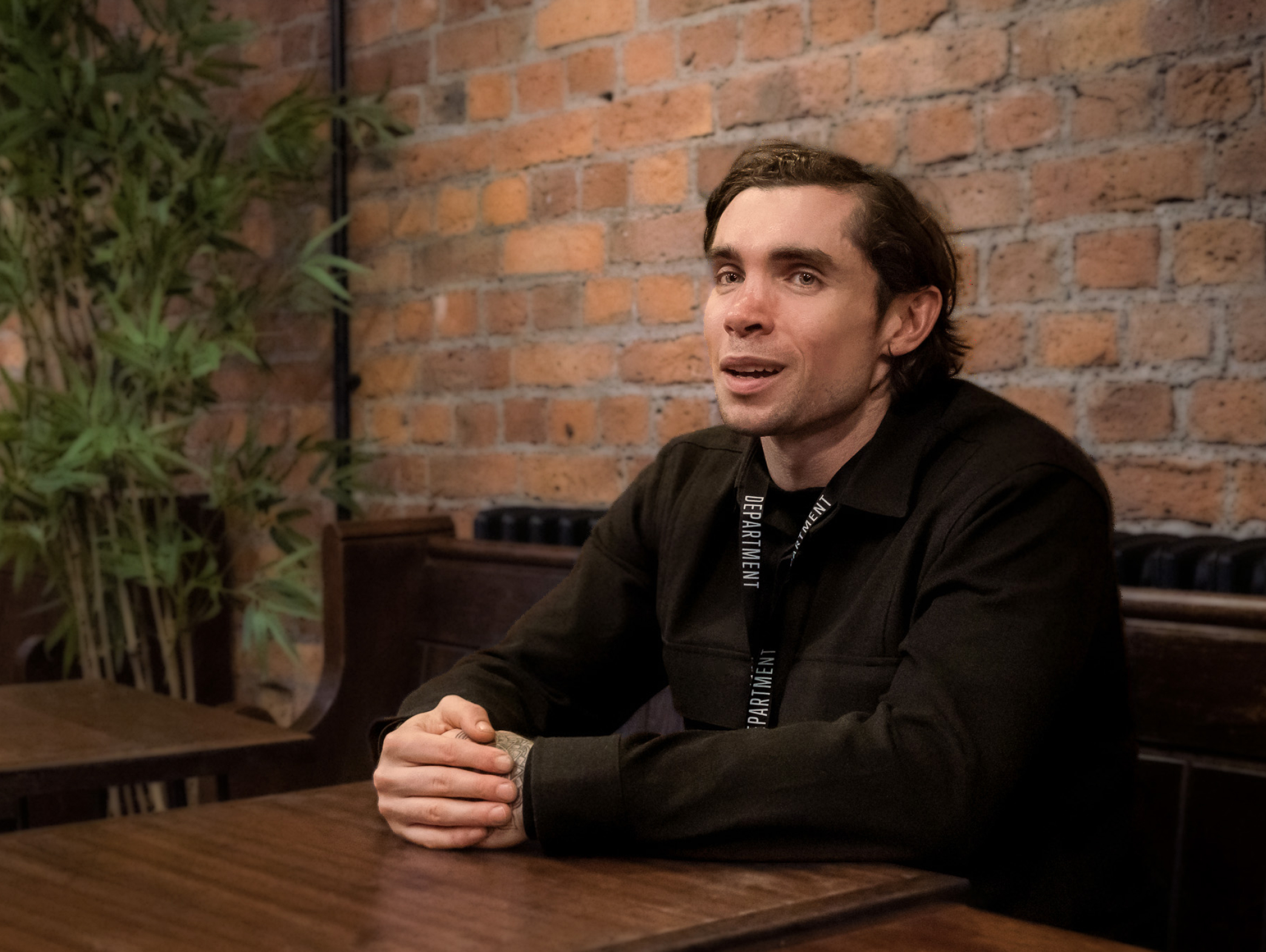- Our People
Building Enterprise AI Solutions While Nurturing Data-Driven Innovation
- #AI
- #Europe
- #Interview
Jack Murphy previously led AI initiatives at Hitachi Solutions Europe, connecting diverse business needs with cutting-edge technological solutions. Since joining the company in 2020, he has played a pivotal role in helping organizations navigate the AI landscape while promoting a collaborative approach to digital transformation.

Guiding Customers Through Their AI Journey
── As someone who coordinated AI activities at Hitachi Solutions Europe, tell us about your role and responsibilities.
When I was the AI Capability Lead at Hitachi Solutions Europe, I was involved in various aspects of customer engagement and AI solution delivery. I supported our sales and marketing teams in initial customer interactions and help us understand the challenges the customer is facing and how they align with potential solutions. When working on projects, I ensured that what we built met the customer’s objectives, was scalable, and delivered tangible value.
Another important part of my work involves educational initiatives and public speaking. Initially, I was quite nervous about speaking in front of an audience, but the more I’ve done it, the more I’ve enjoyed it. I’ve been fortunate to have opportunities to give talks about AI and Power Platform over the last couple of years. One memorable occasion was speaking alongside Microsoft and Rolls Royce about AI strategy in Formula One racing at the Alpine F1 Team’s technical center. Public speaking has become an important part of consulting as it allows us to talk to and educate our customers on areas we think they need to consider.
── Could you tell us about your career path before you took on this role?
After starting my career as an apprentice in IT security, I moved into banking, where I worked with CRM and business apps in a fast-paced environment. I’ve worked on a number of fascinating projects throughout my career including being on the team building a CRM system and data platform for a professional football club. This project showed me the power of combining data and business apps and that if you merge them with AI, you can deliver meaningful results that have a real impact.
I then gained experience with various technologies, including those offered by Salesforce and AWS, before deciding to specialize in the Microsoft stack. I spent three years working primarily with housing associations, which gave me valuable experience in solving complex business challenges. I’ve always looked for intricate problems where somebody says it can’t be done or they’ve tried to do it but haven’t been able to get it to work.
I joined Hitachi Solutions Europe initially in the Power Platform team. My job was to help customers solve business problems using low-code applications technology, and this included assisting customer service teams in managing caseloads and supporting local authorities during the Covid-19 pandemic.
── Throughout your career, you must have worked on a host of different projects. What’s been the most significant one for you at Hitachi Solutions Europe?
One project that left a lasting impression on me took place during the pandemic, when we built a portal for a local authority to help people on low incomes apply for isolation support grants. Working to tight deadlines, we had to build everything from scratch using Power Platform. The portal enabled those who had to self-isolate on low incomes or benefits to access financial assistance during that difficult time.
Implementation and Data Democratization
── What are the initial challenges in implementing AI solutions?
There’s often a misconception that generative AI solutions are plug-and-play. Implementing AI solutions requires careful consideration of data foundations, integration requirements, and organizational readiness. For example, with a project for a UK public sector customer, what started as a generative AI application to help officers prepare for site visits revealed the true complexity of enterprise AI implementation. While our initial proof of concept successfully connected a couple of thousand documents and several systems, we discovered this represented only a small fraction of the data needed for full production deployment.
── In meeting these challenges, have you developed any distinct methods or approaches?
We focus squarely on establishing patterns and governance as part of our center-of-excellence approach. Without patterns, organizations often end up using multiple technologies for similar purposes, resulting in unnecessary expenditure. By implementing clear patterns and processes, such as requiring new initiatives to be reviewed by a technical design authority, we help customers develop solutions more efficiently and maximize their technology investments.
What we often find is that what starts out as a simple generative AI app reveals the need for a comprehensive data infrastructure and integration work. That’s why we want to help customers get past their initial failures quickly. Ideally, every proof of concept succeeds but in reality it doesn’t. So at the outset, we prefer working with an organization to understand what their level of maturity is and potential blockers in their technology estate. Then, where there might be roadblocks to taking a use case from concept to production, we’re able to understand the full scope of data needed to power the production solution.
── How has your approach to data analysis changed with the growth of AI?
If a customer wants to analyze large datasets, traditional approaches will entail significant development work. For instance, you might have a database administrator or software developer constantly updating, tailoring, and fixing dashboards or applications. With generative AI properly deployed on top of a dataset, users can interrogate the data using natural language. This democratizes data analysis, putting power into the hands of anyone who needs access, rather than just those with specialized technical skills.
The challenges vary with industry. In retail, the focus might be on supply-chain and product-specific information, whereas our customers in public sector have their own set of unique challenges. However, the foundational challenges of preparing to leverage AI applications are often very similar.
Evolution and Vision of the Future
── Given the rapid proliferation of generative AI, how do you see the public’s understanding and perception of the technology evolving?
In some areas, such as application development, our customers now have far greater knowledge than they had five years ago. Technology vendors like Microsoft have made it easier for organizations to build business applications themselves, but that doesn’t mean that a problem always requires a solution with technology. That’s where our role as consultants come in. There’s a difference between building a point system and helping our customers shape their Microsoft technology strategy in the long term, and support in solving their highest priority challenges aligned to the best solution while enabling them to put in place the people, processes and tooling to manage their technology estate themselves.
I’d say that with AI, the market is more or less of where it used to be when business applications were in vogue: there’s a lot of interest, and although the skills and maturity around governance aren’t there yet in a lot of cases, many of our customers are experimenting. However, our roles will remain the same since it’s our job to advise and guide customers and help them develop capability in this area.
── With more and more companies looking to leverage AI technologies, what makes Hitachi Solutions Europe unique in the AI consulting space?
What differentiates us as a business is our focus on being an all-in Microsoft Digital Transformation partner. Our solutions focus solely on Microsoft products and services, while our competitors often spread themselves too thin by working with multiple cloud vendors such as AWS, Meta, and Google.
More importantly, in our people we have our greatest asset. We have an incredibly diverse set of skills across Hitachi Solutions Europe, and it’s not just focused on technology. We have world-class teams dedicated to user-centered design, change and learning, quality assurance and data migration.
── As AI makes inroads into business and society, where do you see it going? Are there any fields or industries where you think the technology could have an especially significant impact?
I think in the long run, as the technology matures, customers will be utilizing AI across their application and technology estate.
We are already starting to see the public sector in the UK looking to use AI to deliver more efficient services to citizens and civil servants.
AI is already being implemented in customer service, and contact center scenarios to deliver faster and more efficient customer outcomes, and I’m expecting this demand to grow over the few years.
── When thinking about your future at Hitachi Solutions Europe, what are your aspirations?
I’d like to expand my role advising our customers on their Microsoft technology strategy, helping support larger, more complex programs with a broader set of technologies. While AI is critical, it’s part of a larger technology ecosystem that can solve business problems. With this holistic perspective in mind, I want to help shape the next generation of technological solutions.
Personal Perspectives

I love sports and fitness. I regularly enter fitness competitions and recently participated in a competition in Los Angeles. Outside of work, I enjoy running, going to the gym, and traveling around Europe to experience new places and cultures.
